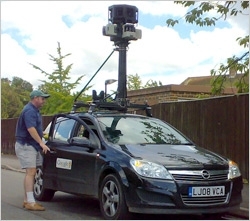
A federal appellate court has affirmed its earlier ruling that Google's Street View cars potentially violated the federal wiretap law by collecting payload data -- including emails, passwords and
URLs visited -- from WiFi networks.
The 9th Circuit Court of Appeals on Friday rejected Google's request for a new hearing in the matter. The decision clears the way for a class-action privacy
lawsuit against Google to proceed to trial.
The litigation against Google dates to 2010, when the company admitted that its cars collected a host of data from WiFi networks that weren't
password-protected. The company apologized and said that it intended to destroy the data. But the revelations prompted a class-action lawsuit against the company -- as well as investigations by
government agencies in the U.S. and abroad.
advertisement
advertisement
Google had argued that it didn't violate the wiretap law, due to the wording of the statute. While the law bans the interception of radio and
electronic communications, it also has an exception for “radio communications” that are “readily accessible to the general public.
The search company argued that it met the
requirements for that exception. The company contended that data sent over WiFi is a “radio communication,” and that the transmissions it captured from unsecured networks were
“readily accessible” to the public.
A trial judge ruled against Google, and the 9th Circuit Court of Appeals upheld that decision on appeal last year. Google then sought
a rehearing at the appellate court. The 9th Circuit turned down that request on Friday, but revised its written opinion. The
new opinion still goes against Google, but for slightly different reasons than the earlier one.
Before, the appellate court said that the WiFi data wasn't publicly accessible because
“most” of the public “lacks the expertise to intercept and decode payload data transmitted over a Wi-Fi network.
Now, the appeals court that WiFi transmissions aren't
“radio” communications -- and therefore it doesn't matter whether they're publicly accessible.
Google unsuccessfully argued to the contrary, pointing out that WiFi data travels on
the radio frequency portion of the spectrum. But the appeals court said that Google's definition of “radio communications” was too broad.
“The radio frequency portion
of the electromagnetic spectrum covers not only Wi-Fi transmissions, but also television broadcasts, Bluetooth devices, cordless and cellular phones, garage door openers, avalanche beacons, and
wildlife tracking collars,” the appellate panel wrote. “One would not ordinarily consider, say, television a form of 'radio communication.'
The judges added that for purposes of
the wiretap law, the phrase “radio communications” should be given its common meaning -- “a predominantly auditory broadcast.”